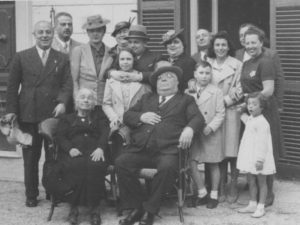CULTURE Documentary on Jewish Family and Destiny in Italy Wins Prestigious Prize
A ‘remarkable experiment, which combines cinema, history and chronicle with a more personal and intimate purpose: to give a voice and a face to scattered loves and families’, said the jury of Nastro d’argento, an Italian film award. This year, the National Union of Italian Film Journalists (SNGCI) awarded the Nastro d’argento speciale (lit. silver ribbon, special edition) to the documentary “Galut, every end is a beginning” (Diaspora, ogni fine è un inizio), produced by Marina Piperno and directed by Luigi Faccini.Here, Daniela Gross tells us about the story of the documentary.
It is a picture like many others, found in an old photo album. The men look serious in their suits, the ladies smile cheerfully and the little girl in the bottom right corner has her eyes and mouth wide open, as if she were about to speak. They were the Pipernos, the Sonninos, the Fornaris, the Biseses and the Di Segnis, gathered at the Pepinos’ house in Anzio (near Rome). It would be a picture like many others, but it is autumn 1938 and nothing is going to be the same after this meeting.
This is the story told in “Galut, every end is a beginning” by Marina Piperno – the little girl with her eyes wide open – 80 years later. For three years, Mrs. Piperno has travelled between the US, Israel and Italy, tracing back the story with her friend and coworker Luigi Monardo Faccini. This 4-hour-and-40-minute-long movie – presented at last year’s Salone Internazionale del Libro (International Book Fair) in Turin – weaves history and family memories together, going through some of the crucial moments of Jewish history and lingering over Jewish identity and the wounds of persecution.
‘I was three years old in that picture. I look astonished, maybe frightened’, said Mrs. Piperno, the first female film producer in Italy and the founder of Reiac Film in 1962. ‘Despite those huge smiles, you could still smell uncertainty. I believe that was the very moment when my relatives decided to emigrate to America to run away from the laws that had isolated them for being Jewish’.
Using original pictures, music, interviews and other visual means, “Galut, every end is a beginning” patiently pieces together a picture that was shattered by persecution through joy and tragedy, escapes and new worlds.
After meeting in Anzio, the Fornaris, the Sonninos and the Bises travel by sea for a long time to organise the emigration. Some go to America, some others to Israel. Some stay and convert to Catholicism. Marina’s father stays in Italy with his old mother Rachele, who was rejected by the US authorities for being too old and no longer productive. His and his relatives’ lives are in danger until the 4th of June 1944, when American soldiers enter Rome.
‘My childhood was marked by separation, diversity and exclusion’, told Mrs. Piperno. ‘I had to study at a Jews-only school. I had excellent grades, even in history of Fascism. What a shame. They said Jews were the evil of the world, they isolated us; yet, they forced us to study the history of Fascism’.
When the Nazis arrest and deport the Jews from Rome, on the 16th of October 1943, the Piperno family gets wind of the roundup and runs away, looking for a place to hide. ‘We walked a long, narrow street, until a door opened and a family took us in. We slept on makeshift beds. I didn’t understand what was going on and wanted to go out. That was the only time in my whole life that my father slapped me in the face’, Mrs. Piperno said.
A six-chapter documentary, “Galut, every end is a beginning” is a deeply emotional journey between the past and the present. It gets to the heart of the Jewish identity and its variations, and it gives a voice to our second- and third-generation American cousins’ nostalgia for their ancestors’ homeland.
Translated by Federica Alabiso, student at the Advanced School for Interpreters and Translators of Trieste University, intern at the newspaper office of the Union of the Italian Jewish Communities.

